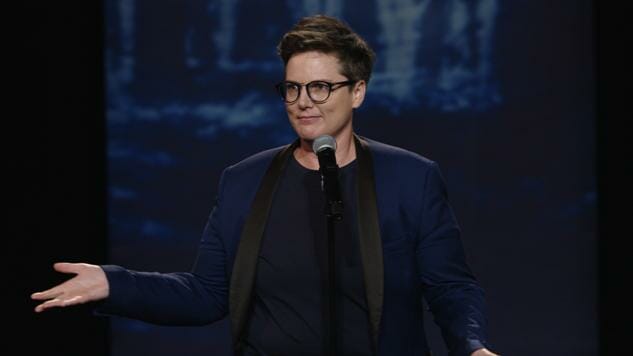Hannah Gadsby’s Excellent Nanette Questions the Idea of a Comedy Special
Photos courtesy of Netflix
Comedy specials rarely have to reckon with a particularly small venue, but almost always have to reckon with a large one. Something that was immediately noticeable about John Mulaney’s Kid Gorgeous earlier this year—a special I really liked—was how Mulaney’s stage presence was dialed up to fill Radio City Music Hall. It totally works—I’m not criticizing Mulaney, I’m just saying it’sinteresting.
You notice something similar in the first few minutes of Hannah Gadsby’s Nanette. Gadsby addresses the cartoonishly cavernous Sydney Opera House with her hands essentially in her pockets, mumbling as if through chewing gum and barely looking over her glasses. But she has charisma to spare, and you’re immediately struck by how effortlessly she seems to reach the back of house despite never moving out from behind the mic stand. “Cool!” I thought to myself. And it was.
But little did I know that Gadsby has to start small, because Nanette grows and grows, past the confines of a comedy special and into something completely different—a riveting screed against misogyny in all forms that utterly abandons its reliance on jokes. In fact, she announces her last joke ten full minutes before the special ends, and by the time it does, the Sydney Opera House can barely contain it.
It is, despite being extremely funny, the anti-comedy special. That’s not a label I’m putting on it—Gadsby announces her intentions for the special very clearly. It’s a work of art that—as someone who both loves comedy and often feels conflicted about its place in our cultural landscape—I’ve been waiting for for a long time without even realizing it.
-

-

-

-

-

-

-

-

-

-

-

-

-

-

-

-

-

-

-

-

-

-

-

-

-

-

-

-

-

-

-

-

-

-

-

-

-

-

-

-








































